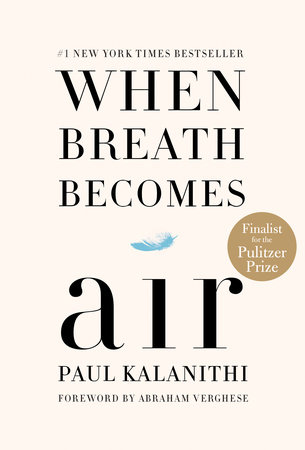When Breath Becomes Air Summary
6 min read ⌚
 At around 9 p.m., on March 9, 2015, Paul Kalanithi, an Indian-American neurosurgeon, passed away after a long and grueling battle with cancer, just a month shy of his 38th birthday.
At around 9 p.m., on March 9, 2015, Paul Kalanithi, an Indian-American neurosurgeon, passed away after a long and grueling battle with cancer, just a month shy of his 38th birthday.
Published several months later by his wife, “When Breath Becomes Air” is his unfinished, thoroughly heartbreaking autobiography.
One which will undoubtedly make you wonder about the meaning of your life as well.
Who Should Read “When Breath Becomes Air”? And Why?
A touching and life-affirming autobiography chronicling the death of a remarkable man, “When Breath Becomes Air” is Paul Kalanithi’s “Last Lecture,” the things he had an urge to share with the world once realizing that his life is nearing to an end.
As such, this book should be relatable to everyone.
And it ought to be read by everyone as well.
About Paul Kalanithi
 Paul Sudhir Arul Kalanithi was an Indian-American neurosurgeon and an author.
Paul Sudhir Arul Kalanithi was an Indian-American neurosurgeon and an author.
Born on April 1, 1977, Kalanithi graduated as valedictorian from Kingman High School, before earning a B.Sc. in human biology and a B.A. and M.A. in English literature from Stanford.
Afterward, he attended the University of Cambridge – from where he obtained an M.Phil. in the History and Philosophy of Science and Medicine – and the Yale School of Medicine, where he graduated cum laude and met his future wife.
In May 2013, Kalanithi was diagnosed with terminal lung cancer; he died two years later.
Though left unfinished, “When Breath Becomes Air” was published, with an epilogue from his wife, in January 2016 by Random House.
“When Breath Becomes Air PDF Summary”
Paul Kalanithi was born on April 1, 1977, in Bronxville, Westchester County, New York to a Christian family hailing from India.
A doctor, his father spent most of his time away from home, which resulted in Paul’s disenchantment with medicine even before he developed any interest in it.
When Paul is 10, the family moves to Kingman, Arizona.
This gets Paul’s mother worried: Kingman, Arizona is “the least educated district in America” and she believes too much in the academic future of her three sons to allow any risks.
Her solution?
She acquires college reading lists and makes her sons read every book on them. They even take their SATs in Las Vegas, about 100 miles away from Kingman.
This is not a problem for Paul: he’s enamored with literature and enjoys few things more than an afternoon passed over any book written by Thoreau, Poe, Orwell, Camus, Sartre, Beckett.
However, during the summer before college, his then-girlfriend borrows him a book by Jeremy Leven, titled “Satan: His Psychotherapy and Cure by the Unfortunate Dr. Kassler, J.S.P.S.”
Kalanithi is fascinated by Leven’s idea that the brain is merely a machine which allows the mind to exist (in much the same manner, that the hardware of your computer is a vehicle for the browser on which you’re reading this text).
So, he started a course in biology and neuroscience.
These areas – literature and neuroscience – will remain lifelong interests for Paul: the former because it delved in the meaning of what it means to be alive, and the latter because it’s a science of the mechanisms which produce this meaning.
He felt – as he says himself at one place – that “literature provided the best account of the life of the mind, while neuroscience laid down the most elegant rules of the brain.”
Paul was a cum laude student, and everything was going great until the beginning of 2013: he had an MA in literature and was in the final stages of his residency training in neurosurgery when he first started feeling severe back pain and signs of exhaustion.
He was worried that these might be the signs of spinal cancer, but the X-ray results of a routine medical check-up looked just fine.
His primary care doctor determined that the pain and the lost weight must be the result of his 14-hour workdays – something which seemed like all but the most logical conclusion to Paul as well.
However, his health deteriorated in the following months, and even before he got the results of his CT scan in the month of May 2016, Paul and his wife Lucy were already prepared for the worst.
Its name sounds as sickening and as gruesome as what it actually represents:
Stage-IV non-small-cell EGFR-positive lung cancer.
“I need you,” Paul whispered to his wife.
“I will never leave you,” she replied.
Kalanithi, the doctor, was suddenly a patient; Kalanithi, the avid reader, was suddenly the book that he needed to read and comprehend:
Grand illnesses are supposed to be life-clarifying. Instead, I knew I was going to die—but I’d known that before. My state of knowledge was the same, but my ability to make lunch plans had been shot to hell. The way forward would seem obvious, if only I knew how many months or years I had left. Tell me three months, I’d spend time with family. Tell me one year, I’d write a book. Give me ten years, I’d get back to treating diseases. The truth that you live one day at a time didn’t help: What was I supposed to do with that day?
Even before Paul started his therapy, he discussed with his wife the possibility of starting a family.
“Will having a newborn distract from the time we have together?” Lucy asked Paul. “Don’t you think saying goodbye to your child will make your death more painful?” she added.
And then Paul said something as remarkable as anything:
“Wouldn’t it be great if it did?”
Lucy tells this same story in the clip below.
A word of warning, though, if you intend to watch it: prepare some tissues beforehand:
Paul’s situation got better at first, but then the worst happened: he stopped reacting to the chemotherapy, and by the time his daughter – Elizabeth Acadia (Cady) – was born (4 July 2014), he was so exhausted that he was unable to stand in the delivery room and had to lie on a cot while Lucy was giving birth.
Despite all the pain and suffering, Paul is filled with an incredible amount of joy at seeing his daughter for the first time.
Unfortunately, merely eight months later, he will see her for one last time.
Key Lessons from “When Breath Becomes Air”
1. Paul Kalanithi Was a Remarkable Man
2. Life Is What Happens to You While You’re Busy Making Other Plans
3. Life Isn’t About Avoiding Suffering
Paul Kalanithi Was a Remarkable Man
Paul Kalanithi had almost everything: a Stanford MA in literature and a cum laude degree from Yale School of Medicine; nearly completed residency training for a neurosurgeon; quite a few published articles and even more prestigious awards; numerous successful operations; finally, a beautiful wife.
Life Is What Happens to You While You’re Busy Making Other Plans
And then he was diagnosed with metastatic stage IV non-small-cell EGFR-positive lung cancer.
As he says himself, his “carefully planned and hard-won future no longer existed. Death, so familiar to me in my work, was now paying a personal visit.”
And that’s what often happens in life: something completely unexpected changes the course of planned events once and for all.
Life Isn’t About Avoiding Suffering
Paul Kalanithi didn’t live enough to complete “When Breath Becomes Air.”
Its epilogue was written by his wife, who shares the most important lesson she learned (in the form of advice given to Lucy and Paul’s daughter) in a heartbreaking TED Talk, delivered a year and a half after the death of her husband.
Cady, engaging in the full range of experience — living and dying, love and loss – is what we get to do. Being human doesn’t happen despite suffering. It happens within it. When we approach suffering together when we choose not to hide from it, our lives don’t diminish, they expand.
Like this summary? We’d like to invite you to download our free 12 min app, for more amazing summaries and audiobooks.
“When Breath Becomes Air Quotes”
You can’t ever reach perfection, but you can believe in an asymptote toward which you are ceaselessly striving. Share on X Human knowledge is never contained in one person. It grows from the relationships we create between each other and the world, and still it is never complete. Share on X There is a moment, a cusp, when the sum of gathered experience is worn down by the details of living. We are never so wise as when we live in this moment. Share on X I can’t go on. I’ll go on. (Via Samuel Beckett) Share on X Even if I’m dying, until I actually die, I am still living. Share on XOur Critical Review
Writing for the USA Today, Mack McCarthy, wrote that “When Breath Becomes Air” is “a story so remarkable, so stunning, and so affecting” that he “had to take dozens of breaks just to compose [himself] enough to get through it.”
Chances are – you are going to need quite a few breaks as well.
But that could only mean one thing and one thing only: if you haven’t read “When Breath Becomes Air” so far, you must do it in the very recent future.
It’s not that Kalanithi’s memoir will bring you to tears and help you live through the beauty of a profoundly cathartic emotion. It’s that it will make you cherish your life a bit more.
Not many books can do that.
But, then again, there are not many people as extraordinary as Paul Kalanithi.
No, we are not changing the tense in the previous sentence.
Emir is the Head of Marketing at 12min. In his spare time, he loves to meditate and play soccer.







